

1960 Democratic National Convention Address. John F.
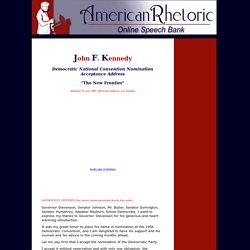
Kennedy Audio mp3 of Address [AUTHENTICITY CERTIFIED: Text version below transcribed directly from audio.] Acceptance of the Democratic Party Nomination (July 15, 1960)—Miller Center. Governor Stevenson, Senator Johnson, Mr.
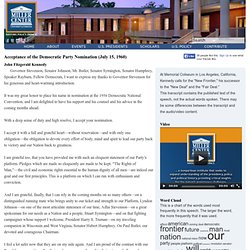
Butler, Senator Symington, Senator Humphrey, Speaker Rayburn, Fellow Democrats, I want to express my thanks to Governor Stevenson for his generous and heart-warming introduction. It was my great honor to place his name in nomination at the 1956 Democratic National Convention, and I am delighted to have his support and his counsel and his advice in the coming months ahead. With a deep sense of duty and high resolve, I accept your nomination. I accept it with a full and grateful heart—without reservation—and with only one obligation—the obligation to devote every effort of body, mind and spirit to lead our party back to victory and our Nation back to greatness.
I am grateful too, that you have provided me with such an eloquent statement of our Party’s platform. I feel a lot safer now that they are on my side again. Under any circumstances, however, the victory that we seek in November will not be easy. But we are not merely running against Mr. John F. Kennedy Speech, July 15, 1960 : John F. Kennedy. John F. Kennedy Photos — History.com Picture Galleries.
John Kennedy and Civil Rights. John F Kennedy is not automatically associated with civil rights issues as Kennedy's presidency is more famed for the Cuban Missile Crisis and issues surrounding the Cold War.
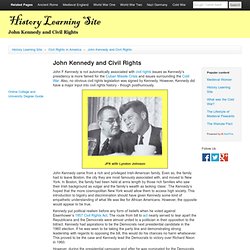
Also, no obvious civil rights legislation was signed by Kennedy. However, Kennedy did have a major input into civil rights history - though posthumously. John Kennedy came from a rich and privileged Irish-American family. Even so, the family had to leave Boston, the city they are most famously associated with, and moved to New York. In Boston, the family had been held at arms length by those rich families who saw their Irish background as vulgar and the family’s wealth as lacking ‘class’. Kennedy put political realism before any form of beliefs when he voted against Eisenhower’s 1957 Civil Rights Act. Famous People - celebrity and historical. John Kennedy Thirty-Fifth President 1961-1963 Born: May 29, 1917 in Brookline, Massachusetts Died: November 22, 1963.
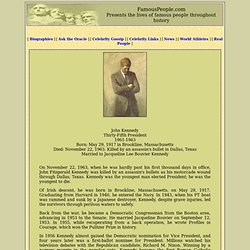
Killed by an assassin's bullet in Dallas, Texas Married to Jacqueline Lee Bouvier Kennedy On November 22, 1963, when he was hardly past his first thousand days in office, John Fitzgerald Kennedy was killed by an assassin's bullets as his motorcade wound through Dallas, Texas. Kennedy was the youngest man elected President; he was the youngest to die. Of Irish descent, he was born in Brookline, Massachusetts, on May 29, 1917. Graduating from Harvard in 1940, he entered the Navy. Back from the war, he became a Democratic Congressman from the Boston area, advancing in 1953 to the Senate. In 1956 Kennedy almost gained the Democratic nomination for Vice President, and four years later was a first-ballot nominee for President. His Inaugural Address offered the memorable injunction: "Ask not what your country can do for you--ask what you can do for your country.
" Assassination of John F. Kennedy. Although the Commission's conclusions were initially supported by a majority of the American public,[4] polls conducted between 1966 and 2003 found that as many as 80 percent of Americans have suspected that there was a plot or cover-up.[5][6] A 1998 CBS News poll showed that 76% of Americans believed the President had been killed as the result of a conspiracy.[7] A 2013 AP poll showed, that although the percentage had fallen, more than 59% of those polled still believed that more than one person was involved in the President's murder.[8][9] A Gallup Poll in mid-November 2013 showed 61% believed in a conspiracy and 30% thought Oswald did it alone.[10] In contrast to the conclusions of the Warren Commission, the United States House Select Committee on Assassinations (HSCA) concluded in 1978 that Kennedy was probably assassinated as a result of a conspiracy.
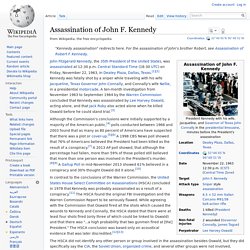
The HSCA found the original FBI investigation and the Warren Commission Report to be seriously flawed. Route to Dealey Plaza[edit] John F. Kennedy. John Fitzgerald Kennedy (May 29, 1917 – November 22, 1963), commonly known as "Jack" or by his initials JFK, was an American politician who served as the 35th President of the United States from January 1961 until he was assassinated in November 1963.
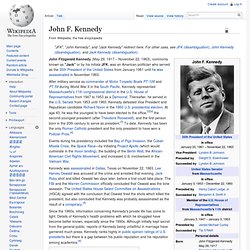
Kennedy was assassinated in Dallas, Texas on November 22, 1963. Lee Harvey Oswald was accused of the crime and arrested that evening. Jack Ruby shot and killed Oswald two days later, before a trial could take place. The FBI and the Warren Commission officially concluded that Oswald was the lone assassin. The United States House Select Committee on Assassinations (HSCA) agreed with the conclusion that Oswald fired the shots which killed the president, but also concluded that Kennedy was probably assassinated as the result of a conspiracy.[5] Since the 1960s, information concerning Kennedy's private life has come to light.
Early life and education The Kennedy family at Hyannisport in 1931 with Jack at top left in white shirt. In 1946, U.S. John F Kennedy Biography. "Ask not what your country can do for you--ask what you can do for your country.
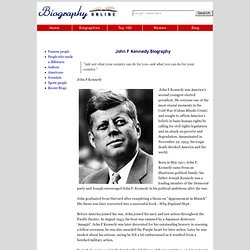
" John F Kennedy John F Kennedy was America's second youngest elected president. He oversaw one of the most crucial moments in the Cold War (Cuban Missile Crisis) and sought to affirm America's beliefs in basic human rights by calling for civil rights legislation and an attack on poverty and degradation.